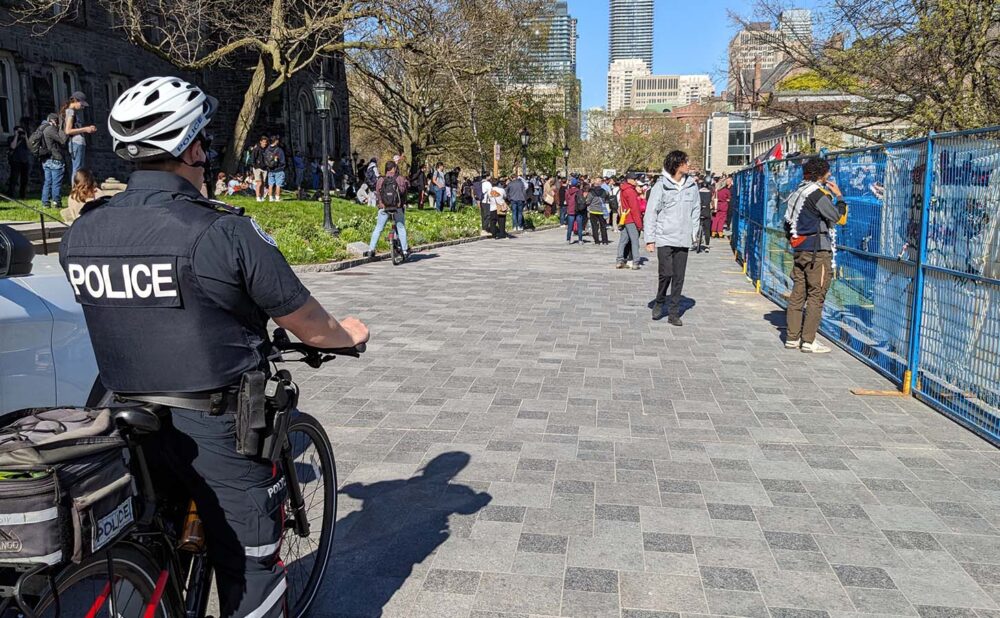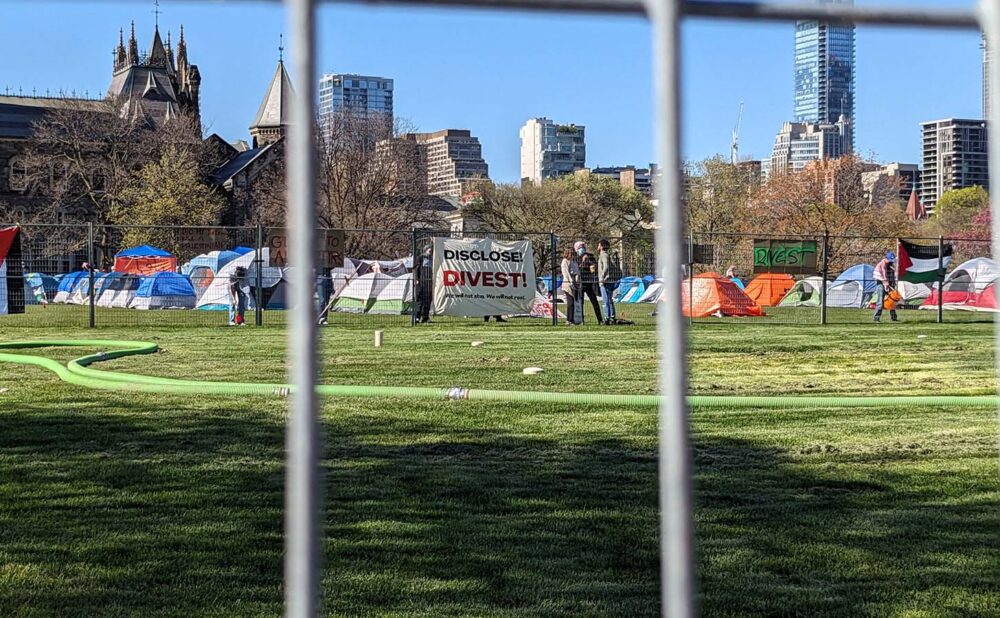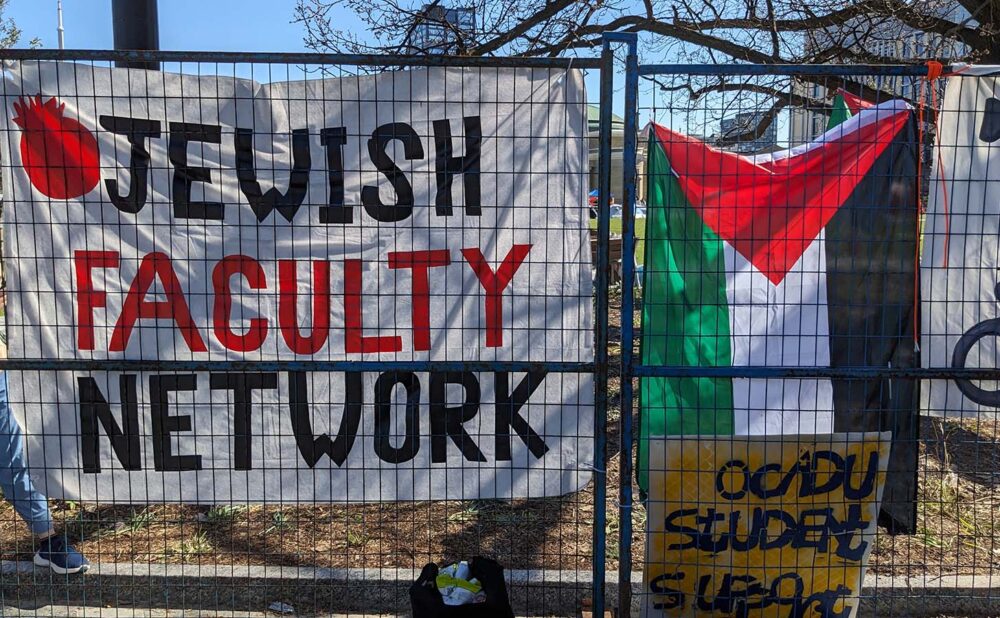Update: Despite the premier’s threats, encampment at U of T isn’t leaving
Peaceful protest continues despite ongoing harassment from counter-protesters, police and now the premier
Despite Premier Doug Ford calling for a police crackdown on Monday, U of T students peacefully encamped at King’s College Circle — now “The People’s Circle for Palestine — aren’t intimidated by him, harassment from counter-protesters or the police. And they aren’t leaving until their demands — that the school disclose and divest its financial ties to Israel — are met.
“The community has proven to keep us safe,” says Sara Rasikh, a graduate student and spokesperson for the encampment. “They’re aware of that: Folks are coming out and supporting us.” It’s why, despite the premier’s threats, they aren’t afraid. Many students and faculty have already shown they are behind the protesters.
Rasikh is referring to when over 1,000 University of Toronto students, alumni, faculty and other local supporters came out on the evening of May 2 to defend the encampment, in defiance of the school’s 10 pm deadline for the protesters to disperse. A massive crowd was singing, chanting and waving their phone flashlights in solidarity with the encamped protesters. The university backed down, saying in a statement, “We do not intend to remove you from campus this evening.”
This ongoing community support has been critical in keeping the encampment going. “We don’t have any formal funding that we’ve been receiving. I know that’s been going around — it’s not true,” says Rasikh. “We’ve just been counting on members of our community to contribute towards this cause.”
The university has since released statements on May 3 and May 6 reiterating that it has been “communicating with a student representative” for the encampment and claiming, “Our discussions have been constructive, and we see a way forward.”
However, Rasikh says the school has yet to address their demands that it disclose and divest its financial ties to Israel. In response, Rasikh says, “We have made it clear in our latest email to them that we will not be conversing with them about anything unless and until it is the demands going forward.”
The need for community solidarity and safety is of huge importance to the protesters as the threat of a violent police crackdown to remove the encampment is ever-present. Premier Doug Ford made his intentions clear Monday, saying “We need to remove those people,” and that the ongoing peaceful protest over the university’s ties to Israel is “unacceptable.”
Rasikh says the encamped protesters feel they can’t depend on the police to keep them safe, despite their constant, watchful presence. “Police presence is definitely an intimidation tactic,” she says, adding, “We don’t intend to engage with them.
“The police do not keep us safe. Campus Safety does not keep us safe. We keep us safe. Community keeps us safe. That’s what I’ve learned.”
A spokesperson for the Toronto Police Service said they remain in contact with the university but that “our assistance has not been requested.” They note they’ve received two reports of “encampment-related occurrences,” both involving alleged assaults of counter-protesters who were arguing with the protesters.
However, the police spokesperson said they were unable to confirm the university’s claim from its May 6 statement that the school submitted “four reports to Project Resolute, a Toronto Police Service initiative to fight anti-Semitism and Islamophobia.” A spokesperson for the university would not elaborate on the nature of those incidents when asked.
Of the counter-protesters, Rasikh says, “They have been harassing not only our campers but also folks coming out to support us — community members, including U of T community members,” something NEXT witnessed on the encampment’s first day, when a counter-protester with a megaphone directed a bizarre rant about religion at praying Muslim students within the encampment.
Just as with the police, Rasikh says their response has been not to engage with the counter-protesters. “We are just focusing on de-escalation. Our encampment does not seek to suppress others’ right to protest. But when they are making the intentional decision to come to our encampment, our protest, to disrupt what we are doing, they are coming with the offensive intention.
“We’re not telling anybody else not to vocalize their differences in opinion. But, of course, when they come and harass folks on site, it is problematic — it is something that the university should take a stand against,” noting the hypocrisy of the university’s official statements chastising the protesters over concerns about hate speech but not the counter-protesters. Even before the protest, Rasikh says, anti-Palestinian racism was “rampant” on campus.
Amid all the headlines about the campus encampment, Rasikh says the reason it’s happening in the first place is getting lost in the mainstream media coverage.
“Our demands for financial disclosure and divestment — they’re supported and grounded in national and international laws. U of T is bound by a legal and moral responsibility to abide by the provisional measures ordered by the ICJ [International Court of Justice] on Jan. 24, 2024, as well as the Canadian government’s parliamentary resolution to end arms sales to Israel.
“They did divest from South African apartheid, from the Vietnam War, which all came after students applied pressure. And so, we’re applying pressure as students have in the past.”
Noting the day’s headlines about Israel’s ongoing assault on Rafah, Rasikh says, “There is still space for them to do the right thing — for them to divest, for them to listen to their students and acknowledge the gravity of the situation at hand.”








